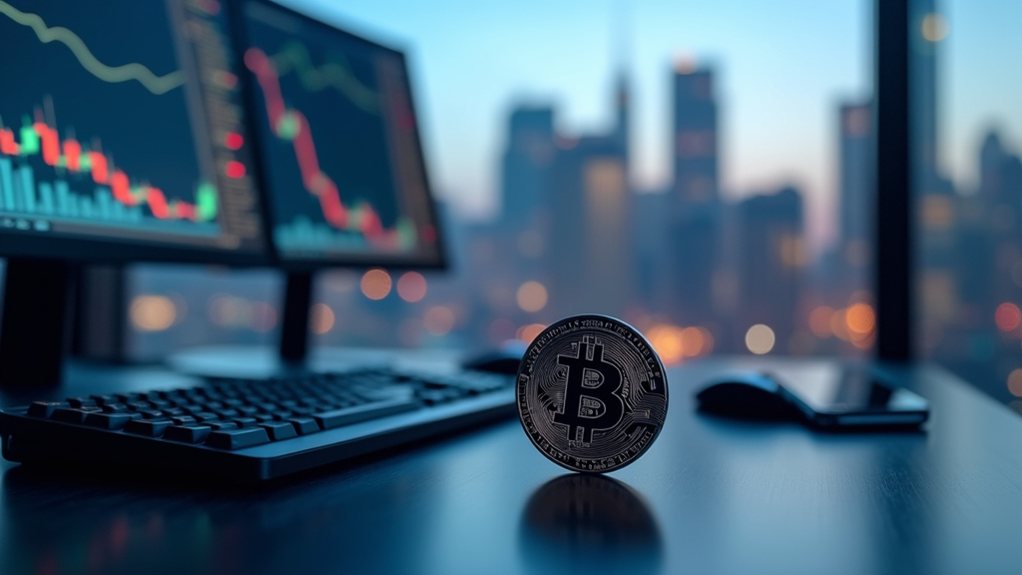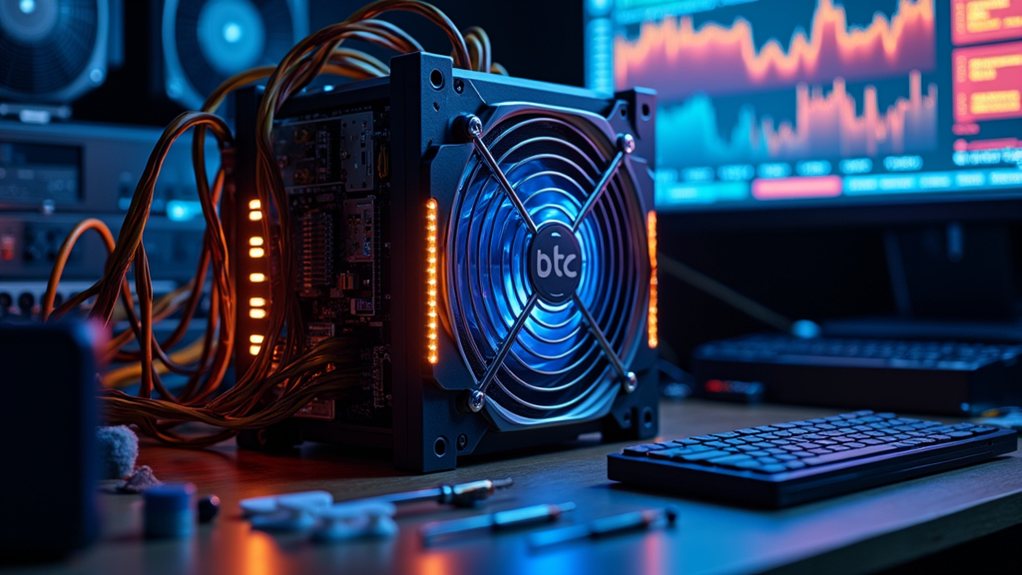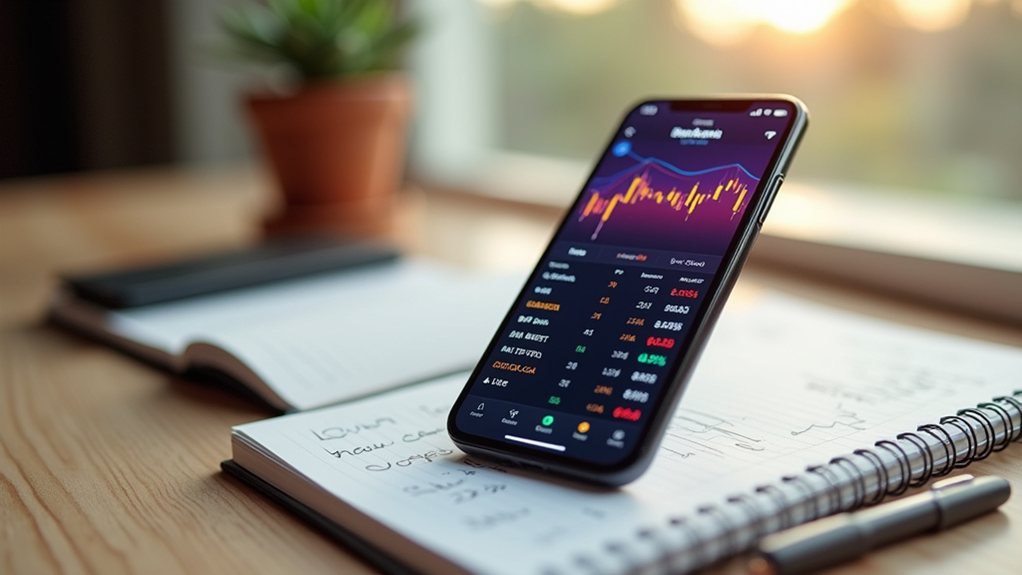OTC (over-the-counter) crypto trading happens directly between two parties, no exchanges involved. It's not complicated. Big investors and wealthy individuals use it to move large amounts of Bitcoin without crashing markets. The process is straightforward: contact an OTC desk, get a quote, agree on terms, execute. Benefits include privacy, reduced market impact, and less slippage. There are risks though—counterparty problems and less transparency. The deeper crypto rabbit hole awaits.

Confusion reigns supreme in the crypto world, and OTC trading might be one of the most misunderstood concepts. OTC, or over-the-counter, crypto trading happens when two parties trade directly without using a public exchange. No fancy order books. No public record. Just two entities making a deal. It's that simple, and yet somehow people still get it wrong.
OTC trading serves a vital purpose in the crypto ecosystem. Big players use it. Really big players. When institutional investors or high-net-worth individuals want to move millions in Bitcoin without tanking the market, they don't hit "buy" on Coinbase. They call an OTC desk. Cryptocurrency miners with freshly minted coins and early adopters sitting on digital fortunes also prefer this method. It's discrete. It's efficient. It works.
When millions are on the line, the smart money doesn't click buttons. They make direct calls to OTC desks.
The process isn't complicated. A buyer contacts an OTC desk with their request. The desk provides a quote. They negotiate if needed, agree on terms, and execute the trade. Cumberland, Genesis Trading, Circle Trade, B2C2, and Galaxy Digital dominate this space. They're the middlemen making these massive deals happen behind the scenes while retail traders play around with limit orders on public exchanges.
Why choose OTC over traditional exchange trading? Market impact, for one. Try selling 1,000 Bitcoin on a public exchange. Watch the price crash in real-time. Congratulations, you just cost yourself money. OTC trading eliminates this problem. Privacy is another benefit. Some traders prefer keeping their moves confidential. Can't blame them. Additionally, OTC desks often provide access to cryptocurrencies not available on mainstream exchanges. Flexibility matters.
Of course, OTC trading isn't all sunshine and rainbows. Counterparty risk exists. Your trading partner could default. Due diligence becomes essential. Price transparency suffers compared to exchanges. The relatively opaque trading environment insulates large transactions from market fluctuations. Potential for manipulation? Absolutely. Regulatory uncertainty looms in some jurisdictions. Trust becomes paramount.
The difference between OTC and exchange trading boils down to a few key points. OTC allows larger trades with less slippage. Exchanges offer better liquidity for smaller amounts. OTC provides privacy and customization. Exchanges standardize everything. OTC trades offer customized payment methods that can be negotiated between parties, unlike exchanges' limited options. OTC requires trust. Exchanges provide infrastructure.
For average retail traders, OTC probably isn't relevant. Small fish don't need these services. But understanding how the big money moves in crypto markets gives context to price movements that might otherwise seem mysterious. The whales swimming in the OTC waters affect everyone's crypto experience, whether they realize it or not. That's just how markets work. The visible part is only half the story.
Frequently Asked Questions
What Are the Tax Implications of OTC Crypto Transactions?
OTC crypto transactions face the same tax scrutiny as any crypto deal.
They're property, not currency—period. Every sale triggers capital gains tax, calculated from purchase price to fair market value.
No hiding behind privacy; the IRS wants its cut. Documentation is essential.
Short-term gains hurt more than long-term ones. Big traders might need quarterly payments.
The tax man cometh, even to decentralized markets. Records or regrets.
How Do OTC Brokers Verify Client Identities?
OTC brokers verify client identities through multiple layers of security. They require government-issued photo IDs and proof of address documents. No shortcuts here.
Many use facial recognition to match faces with ID photos. For high-value trades? Extra documentation.
Technology drives the process now—AI systems, biometric authentication, and real-time verification checks. They also implement KYC procedures and run AML checks against sanctions lists.
Pretty thorough stuff.
Can Retail Investors Access Institutional OTC Crypto Desks?
Retail investors face barriers to institutional OTC desks.
Traditional minimums? Steep. Think $100,000-$250,000. Not exactly pocket change.
But times are changing. Some platforms now offer $10,000-$25,000 minimums.
Still not chump change, but more accessible. Options exist for smaller players – retail-focused services like B2C2 and Cumberland, peer-to-peer platforms, and VIP exchange services.
KYC/AML requirements? Non-negotiable.
Everyone gets vetted. No exceptions.
How Do OTC Crypto Prices Compare to Exchange Rates?
OTC crypto prices can differ substantially from exchange rates. For large trades, OTC often provides better deals—less slippage, better execution. Simple math.
Institutional traders leverage this advantage daily. During volatile periods? The gap widens even further.
Time of day matters too. Asian trading hours see different patterns than US sessions. Market sentiment shifts prices in both environments, but OTC desks react with less drama.
Arbitrage opportunities? They exist, but you've gotta be quick.
What Happens if an OTC Counterparty Fails to Deliver?
When an OTC counterparty fails to deliver, it's not pretty. The non-defaulting party loses funds or assets. Legal action often follows—good luck with that.
Reputation? Destroyed. Market confidence takes a hit too.
Smart players use escrow services, demand collateral, or work through trusted intermediaries. Some employ smart contracts for automation.
Regulators might step in after defaults, especially big ones. The whole industry pays attention. Nobody likes a deadbeat.








